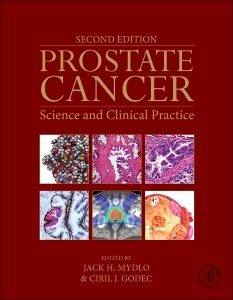Prostate Cancer (2nd Ed.) Science and Clinical Practice
Coordonnateurs : Mydlo Jack H., Godec Ciril J.

Prostate Cancer, Science and Clinical Practice, Second Edition, continues to be an important translational reference that bridges the gap between science and clinical medicine. It reviews the biological processes that can be implicated in the disease, reviews current treatments, highlights the pitfalls where relevant, and examines the scientific developments that might result in future treatments.
Key chapters from the previous edition have been updated, and a plethora of new chapters describe new concepts of prostate cancer biology and newly developed therapeutics. Each chapter has been written by internationally recognized specialists on prostate cancer epidemiology, genetic susceptibility, cancer metastases, prostate physiology, proteomics, new therapeutics, and clinical trials.
Part I: Etiology, Pathology and Tumor Biology
Part II: Genetic Susceptibility and Hereditary Predisposition, Screening and Counseling
Part III: Epidemiology
Part IV: Prevention of Prostate Cancer
Part V: Conservative Management
Part VI: Surgery
Part VII: Radiation Therapy
Part VIII: Clinical dilemmas
Part IX: Advanced prostate cancer
Part X: Cryoablation, HIFU and Focal Therapy
Part XI: Cryoablation, HIFU and Focal Therapy
Part XII: Govermental Policies
Part XIII: New Horizons for Prostate Cancer
Dr. Mydlo has published over 100 peer-reviewed articles, several textbook chapters, and has edited two urological textbooks in renal and prostate cancer. His interests include urologic trauma, urologic oncology, and erectile dysfunction. He has lectured in numerous cities over the United States and Europe. He is a member of the American Urological Association as well as a member of the AUA Judicial and Ethics Committee, The Mid-Atlantic Section of the AUA, The Philadelphia Urologic Society, and a fellow of the American College of Surgeons.
Dr. Ciril J. Godec completed Medical School in 1963 in Ljubljana, Slovenia. In 1969, he passed the Urology Board in Ljubljana. In 1972, Dr. Godec completed his Ph.D. on Rehabilitation of the Neurogenic Bladder under the mentorship of Prof. Dimitrievich from Baylor University. In 1972, as a Fulbright Scholar, he researched bladder dysfunction under Dr. Saul Boyarsky, Professor and Chair of Urology at Washington University in St. Louis, Missouri. After delivering a lecture at the University of Minnesota, Dr. Godec was invited to stay and do research work at St. Paul-Ramsey Hospital. In 1979, he passed his Urology Board in the United States, and shortly thereafter, became the Co-Chief of Urology at Hennepin County
- Presents a comprehensive, translational source for all aspects of prostate cancer in one reference work
- Provides a common language for cancer researchers, oncologists, and urologists to discuss prostate tumors and how prostate cancer metastases affects other major organ systems
- Offers insights to research clinicians, giving them a key understanding the molecular basis of prostate cancer
- Offers insights to cancer researchers into how clinical observations and practices can feed back into the research cycle and, therefore, can contribute to the development of more targeted genomic and proteomic assays
Date de parution : 10-2015
Ouvrage de 672 p.
21.4x27.6 cm
Thèmes de Prostate Cancer :
Mots-clés :
3D-CRT; 5-α reductase inhibitors; active surveillance; adjuvant approach; adverse effects; age-adjusted PSA; alcohol; anastomotic stricture; anatomic MRI; androgen; androgen deprivation; androgen deprivation therapy; androgen independent; androgen receptor; anejaculation; anterior approach; antiandrogen; antiandrogen monotherapy; antigen presenting cell; antigen spreading; artificial urinary sphincter; aspirin; atypical glands; billing; biochemical recurrence; biopsy; biopsy core labeling; biopsy prophylaxis; bladder cancer; bladder neck contracture; bladder neck dissection; bladder neck reconstruction; bone health; bone mineral density; brachytherapy; Bragg peak; breast cancer; Calypso 4D; cancer; cancer biology; cancer management; cancer prevention; cancer risk factors; cancer screening; castrate-resistant prostate cancer; chemotherapy; chromogranin; chromosome; chronic myeloid leukemia; climacturia; clinical practice guidelines; coding; colorectal cancer; combined modalities; comparative effectiveness; complications; conebeam CT; conservative management; cost-effectiveness; cost-utility; cryoablation; cryotherapy; decision support; diet; diffusion weighted MRI; digital rectal exam; disparity; dose escalation; dutasteride; dysorgasmia; early detection and screening; early detection/screening; endocrine disruptors; endocrinology; environmental carcinogens; environmental exposure; epidemiology; erectile dysfunction; ERSPC; etiology; external beam radiation therapy; extraperitoneal; finasteride; focal therapy; free PSA; fusion genes; genetics; genome; Giemsa tissue staining; Gleason score; GWAS; health policy; HGPIN; high-intensity focused ultrasound (HIFU); hormonal therapy; hormone refractory; hormone sensitivity; hormone therapy; hypofractionation; hypogonadism



